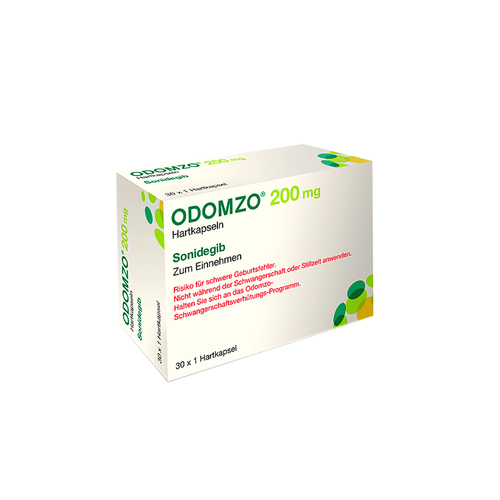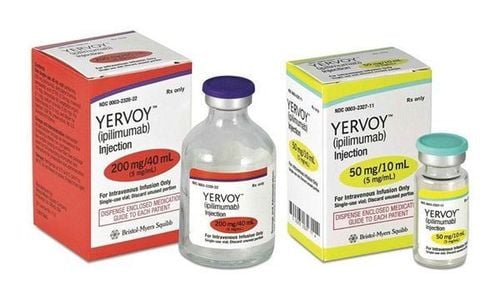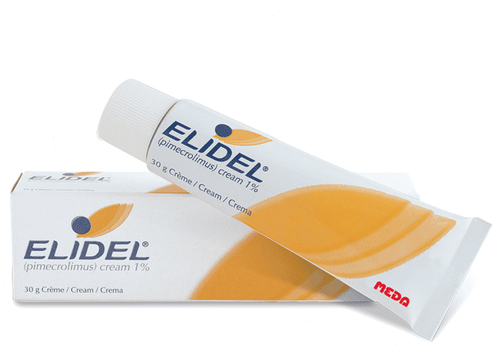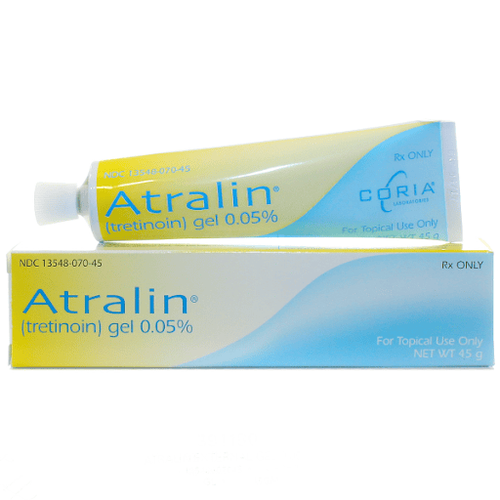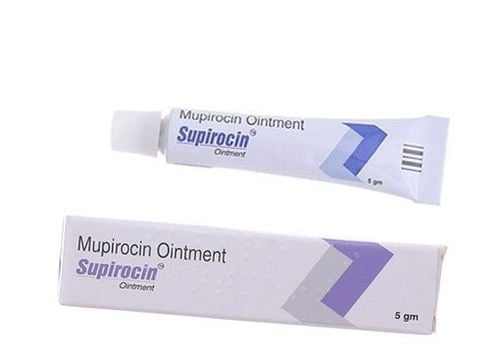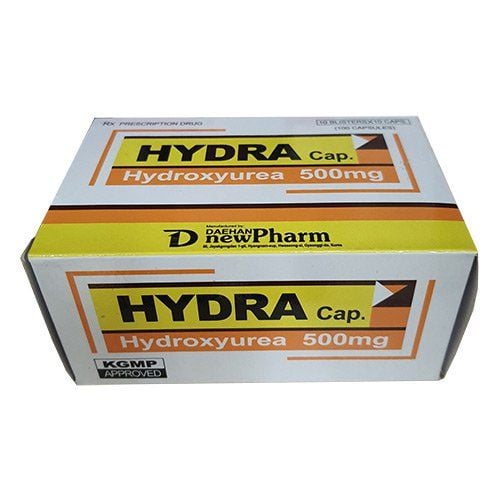This is an automatically translated article.
Article by Master, Doctor Mai Vien Phuong - Gastrointestinal endoscopist - Department of Medical Examination & Internal Medicine - Vinmec Central Park International General Hospital.
Treatment of skin nodules depends on the underlying cause. Most common causes of skin nodules are harmless, so you probably won't need treatment. However, if skin nodules interfere with daily activities, you can remove them for cosmetic reasons.
1. What are skin nodules?
Skin raised bumps are very common and most of the time they are harmless. These can be the result of a number of conditions, including infections, allergic reactions, disorders, and skin cancer.
Skin bumps can vary in shape and number depending on the cause. They can be the same color as your skin or a different color, itchy, large or small, hard and soft.
2. Causes and types of skin nodules
The most common causes of bumps on the skin are:
Acne : The most common cause of facial nodules in the United States. It causes bumps on the skin, which can be very small and painless. The nodules are often accompanied by redness and swelling. Boils: These are infected hair follicles that look like red bumps on the skin. They can be painful, but they eventually go away once they break and release fluid. Bullae: These are swollen, fluid-filled bumps that can be caused by friction or conditions like contact dermatitis and chickenpox. Cherry angiomas: A common skin tumor and a cause of skin nodules. This type of tumor can form on almost any area of the body. They develop when blood vessels clump together and create a bright red bump under or on the skin. Cold sores: These are red, fluid-filled bumps that form around the mouth or other areas of the face and can burst. They are caused by a common virus called herpes simplex. Contact dermatitis: An allergic reaction on the skin that produces a red, itchy rash on the skin. The rash may include raised, watery, or crusted red bumps. Calluses or calluses: These are rough, thickened areas of skin. They are most commonly found on the feet and hands. Cysts: These tumors contain fluid, air, or other substances. They develop under the skin in any part of the body. They feel like a small ball and can often move around slightly. Keloids: Smooth, raised growths that form around the scar. They are most commonly found on the chest, shoulders, and cheeks.

Keratosis pilaris: A skin condition marked by an overgrowth of a protein called keratin. It causes small bumps around the hair follicles on the body. Lipomas: Collections of fatty tissue under the skin and are usually painless. They often form on the neck, back, or shoulders. Molluscum contagiosum: These are small, flesh-colored bumps with a central depression that usually form on all parts of the body. They can arise from skin-to-skin contact with someone affected by them. Nodules: These are the result of abnormal tissue growth and can appear on the skin in common areas such as the armpits, groin, and head and neck areas. Seborrheic keratosis: These are round, rough nodules on the surface of the skin. They can affect many areas of the body, including the chest, shoulders, and back. They can be skin-colored, brown, or black. Excess skin: Small, fleshy flaps of skin. They usually appear on the neck and armpits, and can be the same color as the skin or a little darker. Strawberry hemangioma: A red birthmark also known as a hemangioma. They are most common in young children and usually disappear by age 10. Warts: These raised bumps are caused by the human papillomavirus (HPV). They usually develop on the hands and feet. They can be skin-colored, pink, or brownish. Some less common cases of skin nodules are caused by a serious condition that requires treatment. Some bacterial and viral infections cause swelling and will get worse if they are not diagnosed and treated. These serious factors include:
Chickenpox : A common childhood virus characterized by red, itchy bumps that form all over the body. Impetigo: A common bacterial skin infection in young children that is highly contagious and results in red, oozing blisters that develop into honey-colored scabs. MRSA (staph) infection: This disease is caused by staph bacteria that normally live on the skin causing a painful, bumpy bump with a white center. Scabies: A skin infection caused by a small bug called Sarcoptes scabiei, an itchy, pimple-like rash. Other skin nodules can be caused by skin cancer and require medical management and treatment. Specifically:
Active keratosis: A precancerous skin condition, characterized by scaly, scaly spots on sun-exposed areas of skin, such as the hands, arms, or face. These spots are usually brown, gray, or pink. The affected area may itch or burn. Basal cell carcinoma: A type of cancer that affects the top layer of skin. It produces painful, bleeding bumps in the early stages. The associated bumps appear on sun-exposed skin and can be discolored, shiny, or scar-like. Squamous cell carcinoma: A type of skin cancer that starts in the squamous cells. These cells make up the outermost layer of the skin. This condition causes scaly, red patches and raised sores on the skin. These abnormal growths often form in areas exposed to UV radiation. Melanoma: The least common but most serious form of skin cancer. It begins as an atypical mole. Cancerous moles are usually asymmetrical, multicolored, and large, with irregular borders. They can appear anywhere on the body.
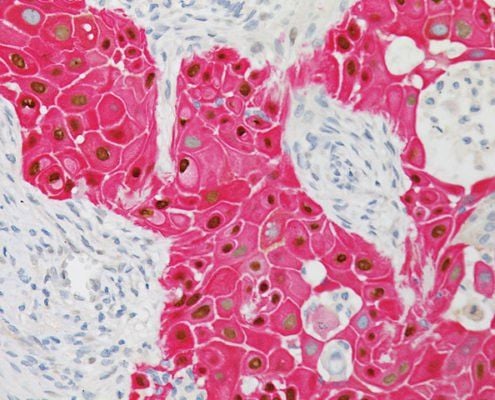
3. When to see a doctor about skin nodules?
Most skin bumps are harmless and not cause for concern. However, you should see a doctor if:
The bumps on the skin change or worsen in appearance, persist for a long time. You have pain or they cause discomfort. You don't know the cause of the bump. You suspect you have an infection or skin cancer. Your doctor will do a physical exam and check for any swelling on your skin. You need to answer questions about the bump, medical history, and lifestyle habits.
Your doctor may also conduct a skin biopsy to check if a bump on the skin is cancerous. This procedure involves taking a small sample of skin tissue from the affected area for analysis. Depending on the results, your doctor may refer you to a dermatologist or other specialist for further evaluation.
MyVinmec tool can provide your health services if you have any health problems.
4. Treatment of skin nodules
Treatment of skin nodules depends on the underlying cause. Most common causes of skin bumps are harmless, so you probably won't need treatment. However, if skin nodules interfere with daily activities, you can remove them for cosmetic reasons. For example, a dermatologist can remove skin tags or warts by freezing them. Dermatologists can also surgically remove some bumps on the skin, including cysts and lipomas. Other bumps that are itchy or irritated can be treated with topical ointments and creams.
In cases where additional skin nodule treatment is needed, your doctor will prescribe medication that can help get rid of the skin bumps and the underlying cause. For bacterial infections, such as MRSA, you may need antibiotics. For viral infections, such as chickenpox, your doctor may recommend over-the-counter medications and home treatments. Some viral infections, such as herpes, cannot be cured. However, your doctor may give you medication to ease your symptoms.
If your doctor finds that the bumps on your skin are cancerous or precancerous, they will most likely remove the bumps altogether. You'll also need regular follow-up visits so your doctor can check the area and make sure the cancer hasn't come back.

5. Long-term outlook for skin nodules
For most skin bumps, the long-term outlook is quite high. The majority of bumps are caused by a harmless, temporary condition that does not require treatment. If the skin bumps are caused by an infection or a long-term condition, prompt medical treatment is needed to effectively clear or relieve symptoms. The outlook is also good when skin cancer is found early. However, regular follow-up will be necessary to make sure the cancer does not recur or grow. As a result, the outlook for more advanced forms of skin cancer varies from situation to situation.
The above information is for reference only. You should consult your doctor before deciding on any treatment. If you need more advice and examination at Vinmec Health System Hospitals nationwide, please book an appointment on the website for service.
Please dial HOTLINE for more information or register for an appointment HERE. Download MyVinmec app to make appointments faster and to manage your bookings easily.





